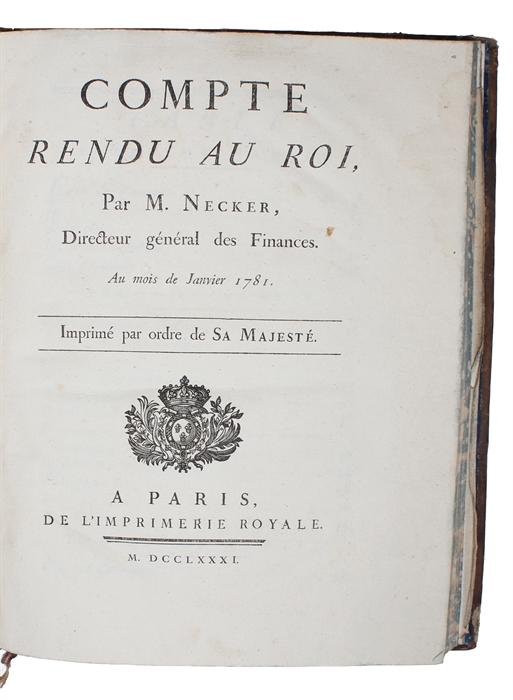NECKER, M.
Compte rendu au Roi, par M. Necker, directeur general des Finances. Au mois de Janvier 1781.
Paris, L'Imprimerie Royale, 1781. 4to. Bound in a very nice contemporary full mottled calf with richly gilt spine with five raised bands. Black leather title label with gilt lettering to spine. Gilt edges and gilt borders to boards. Spine with light wear, title label lacking lower right corner. Four small holes to hinges. Hinges are, however, firm and strong. First plate lacking a piece of top right corner, not affecting text. Overall a very fine and attractive copy. Pp. (4), 116 + 3 large folded plates.
First edition of Necker's seminal work which constitutes the very first public presentation of the French government's income and expenditures.
The report stated that ordinary revenues in France were exceeding expenditure by over 10 million livres. The health of the accounts as reported in the Compte rendu boosted confidence among lenders and ordinary people, who saw Necker as a strong financial manager due to his prior work as a banker; the report strengthen his reputation further. As a consequence, the French government was able to raise new loans to pay for the costs of continued involvement in the American War of Independence. Thereby he used his economic skills not only to help the domestic economy but also as a mean of foreign political pressure.
"In 1781 Necker's famous Compte Rendu au Roi appeared, addressed rather to the public than to the head of the state. His popularity increased; the success of his report, the first of its class, though incomplete, was great." (The New palgrave)
The French bankier Jacques Necker, who was appointed French Minister of Finance during three periods (1777-1781, 1788-1789, 1789-1790), was famous for his opposition to the physiocrats. He replaced Turgot in as Minister of Finance in 1776, and attacked Turgot's plan for free trade in grains.
He initiated economic reforms which were designed to help the poor French economy. Instead of using the more traditional method of raising taxes he, on the contrary, raised the interest rates and kept the comparatively low income-tax.
His will and ambitions to inform and educate the people together with the fact that he was a commoner made him popular with the people. Partly due to his public popularity, on July 11th 1789 he was dismissed, an act which caused public rioting. These riots, combined with the economic crisis and high inflated corn-prices, led to the storming of the Bastille on July 14th 1789.
Einaudi 4094
Mattioli 2549
Order-nr.: 48510


